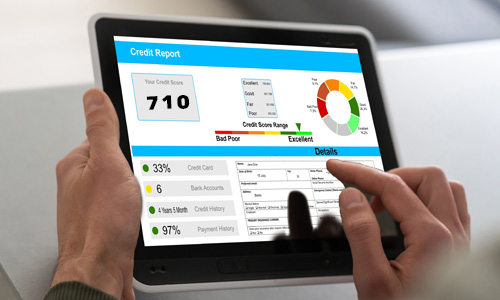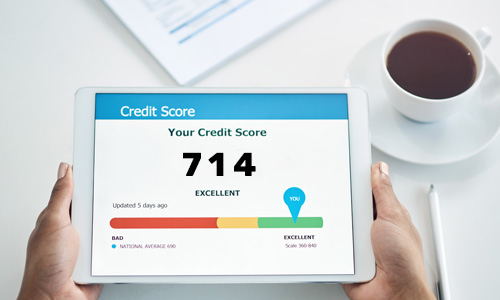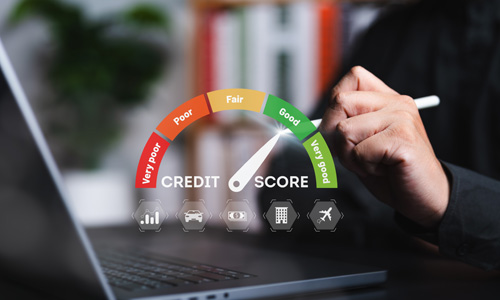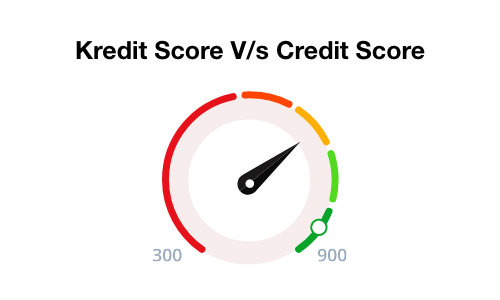How to Check Credit Scores in the UAE
In the dynamic financial landscape of the United Arab Emirates (UAE), where opportunities abound and dreams take flight, a three-digit number holds significant power - your credit score.
Whether you are considering securing a loan for your dream home, applying for a credit card with lucrative benefits, or simply looking to gain insight into your financial health, understanding how to check your credit score is a crucial first step.
In this comprehensive guide, we will learn how to check your credit score in the UAE. We will also explore the factors that influence your score and how to interpret the digits that can open doors to financial opportunities.
Documents Required to Check Credit Score
Listed below are the documents required to check your credit score in the UAE -
For Individuals
- Original Emirates ID
- A Copy of Passport
- Valid Email Address
- Other Documents as and When Required
For Companies
- Valid Trade Licence
- Valid Email ID
- Authorised Document from the Bank
- Authorised Letter from the Company’s Manager, Partner, or Owner
- Other Documents as and When Required
Fees Structure
As an individual, you can access aecb.gov.ae (the official website of al etihad credit bureau or the AECB) to acquire your credit report and score by paying a fee of AED 84. If you're only interested in the score, you can simply get it for a fee of AED 10.5.
All you need to do is register your information, furnish your Emirates ID and passport number, finalise the payment, and receive the report via email within moments.
Alternatively, you have the choice to install the AECB app, which is accessible on both Google Play and the App Store, and retrieve your report through this platform.
How to Check Credit Scores in the UAE?
Discussed below are the ways to check credit score in the UAE -
Via Al Etihad Credit Bureau Website
- Visit AECB’s official website — aecb.gov.ae.
- Register and log into your AECB account.
- You will be navigated to the ‘Get Your Credit Score and Report’ page.
- Once there, click on the Credit Score tab and choose the Buy Now option.
- Pay the required fee to avail of the credit score.
Using the Al Etihad Credit Bureau Mobile Application
- Download the AECB mobile application from the App Store or the Google Play Store.
- Register and log into your AECB account.
- Click on the ‘Get Your First Credit Score’ option.
- Check out and pay the fee to get the credit score.
Via Policybazaar.ae
If you want to get an idea of your aecb credit score but avoid paying fees for the same, you can always visit the ‘credit score’ section of Policybazaar.ae. Working in partnership with Al Etihad Credit Bureau (AECB), Policybazaar UAE enables you to check your credit score range for free.
All you need to do is provide some basic information on the credit score page of our site to check your credit score range for free.
Via Your Credit Card Provider or Bank
Numerous providers of credit cards and loans offer existing cardholders and borrowers a complimentary credit score. This score is typically refreshed along with your monthly statement and could be the same as the one employed by the company for assessing new applicants and their existing clients.
Discover whether any of your present creditors provide this as a no-cost service and determine whether your credit score is automatically provided each month or if you need to enrol in their free credit score program.
Factors that Affect Credit Scores in the UAE
Credit scores typically rely on data from one of your credit reports to calculate your score, utilising intricate algorithms. The effect of each new data point on your score hinges on the existing information in your credit profile. In simpler terms, it's impossible to predict the exact credit impact of a specific action for everyone.
Nonetheless, there are overarching categories that influence your credit scores. You can arrange these categories in order of importance based on how the factors within each group usually impact your score.
These factors are ranked as follows -
- Payment History - Your payment history is almost always the most crucial factor in determining your credit scores. Timely bill payments can boost your credit, while late payments, accounts in collections, and bankruptcy filings can significantly lower your scores.
- Debt Amount - The number of accounts with outstanding balances and your progress in repaying loans significantly affect your credit scores. Within this category, your revolving credit utilisation ratio is particularly vital. It gauges how much of your credit card limit you're currently using. Maintaining a low utilisation ratio is optimal for your scores.
- Length of Credit History - The age of your oldest and newest credit accounts, as well as the average age of all your accounts, can impact your credit scores. In general, a longer credit history tends to result in higher scores.
- New Credit - Opening new accounts and applying for credit, which is indicated by a hard inquiry on your credit report, can also influence your scores. Typically, a hard inquiry may have a minor negative impact on your scores. However, while establishing new credit accounts can be essential for long-term credit building, making multiple credit applications in a short period can negatively affect your credit score.
- Credit Mix - Maintaining both revolving and instalment credit accounts demonstrates your ability to handle various types of credit, potentially benefiting your credit scores.
However, as this category doesn't carry as much weight in scoring compared to the previous ones, you should avoid opening new credit accounts solely for the purpose of diversifying your credit mix.
Tips to Boost Credit Score in the UAE
Here are some easy ways to increase your credit score in the UAE -
Obtaining a New Credit Card -
If you have never acquired a credit card or taken out any loans, it doesn't necessarily imply that your credit score is high. The process of building a credit score usually commences only when you obtain a credit card or take out a loan.
If you currently lack a credit card and your credit score is suffering due to irregular loan payments, consider applying for a credit card and ensure that you make timely bill payments. This can potentially lead to an improvement in your credit score.
Engaging with Financial Institutions -
Initiate a conversation with your bank and attempt to negotiate the settlement of at least half of your outstanding credit card balance or other instalment debts.
Banks have the capability to engage with credit bureaus, such as AECB, regarding the partial settlement of outstanding dues. Such actions can positively impact your credit score. Additionally, making deposits into your bank account can also yield favourable results for your credit report and score.
Reviewing Your AECB Credit Report -
In some instances, credit reports may contain inaccuracies with respect to your personal information. As these errors can negatively impact your score, it is advisable to periodically obtain a copy of your credit report from the AECB and scrutinise all the details to ensure their accuracy.
Timely Bill Payments -
Avoid delaying the payment of your credit card bills. Timely payment of credit card bills, as we saw earlier, is instrumental in enhancing your credit score.
This principle applies not only to credit card bills but also to other regular monthly payments for loans such as personal loans, home loans, auto loans, and so on. Missing monthly instalments can cause a decline in your credit score.
Settling Existing Debts -
Consider settling your existing loans if feasible. This can significantly bolster your credit score and improve your credit report.
Management of Existing Credit Cards -
If you possess unused credit cards, start using them and ensure prompt bill payments. Accumulating an excessive number of credit cards is not advisable.
However, if you do have multiple cards, make sure none of them remains dormant — closing an inactive credit card account can negatively impact your credit score. So if you possess unused credit cards, make occasional transactions with them and promptly settle the bills.
Avoid Repeated Loan Applications -
In the case of rejection by a bank for a loan application, refrain from submitting multiple applications in quick succession and experiencing repeated rejections.
Instead, you should try to comprehend the reasons behind the rejection and take remedial action. While banks typically don’t divulge the specific reasons for loan rejections, you can always consider various factors such as enhancing your credit score, maintaining a favourable Debt Burden Ratio, and providing accurate documentation.
Each rejected loan application is recorded in your credit report, which can adversely affect your credit score.
Limit Opening New Accounts -
Exercise caution when contemplating the opening of multiple bank accounts simultaneously. Unless you have a sufficient credit profile to maintain these accounts, avoid opening bank accounts that don’t contribute positively to your credit score.
Have a look at some frequently asked questions related with respect to how to check your credit score.
| Credit Score for different types of Loan | |||
|---|---|---|---|
| Credit Score for Personal Loan | Credit Score for House Loan | Credit Score for Car Loan | Credit Score for Student Loan |
Frequently Asked Questions
Ans: To improve your credit score, you should focus on paying your credit card and utility bills on time, limiting the frequency of credit applications, and managing debt wisely.
Ans: To access your credit score using the AECB website or app while residing outside the UAE, you will need both an Emirates ID and a registered mobile phone in order to finalise the procedure.
If you prefer to authorise a third party to handle this procedure on your behalf, they will be required to provide the following documents -
- A duplicate of your Emirates ID and passport
- A valid copy of the power of attorney
- A copy of their own Emirates ID for obtaining the score or report
Ans: Yes, your financial reliability is taken into account by telecom companies when determining your eligibility for certain services or the option to make purchases with instalment payments.

More From Credit Score
- Recent Articles
- Popular Articles












